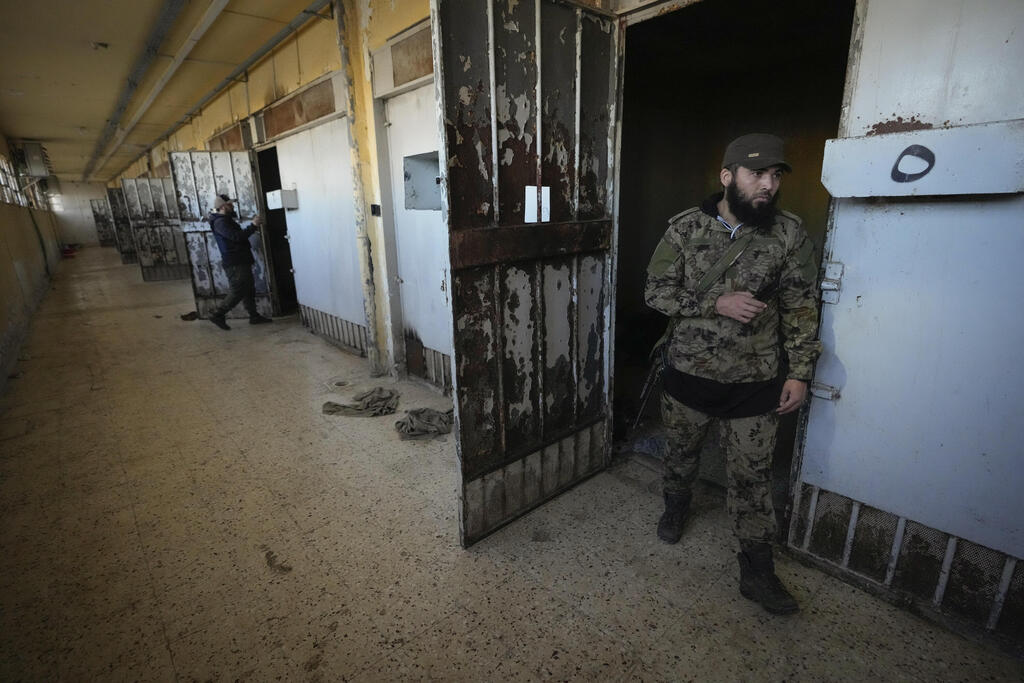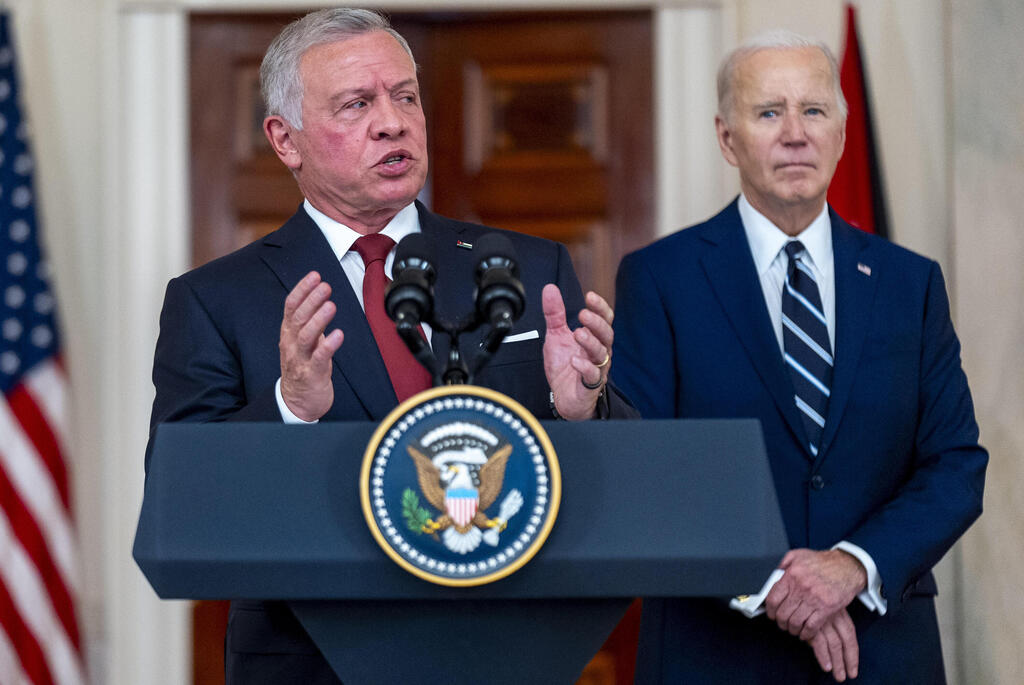In recent days, voices expressing concern over Jordan's future have grown louder following the overthrow of Syrian dictator Bashar Assad by rebel forces.
One fear is the potential rise of Islamist forces within Jordan, while another relates to Iran’s attempts to establish footholds in the Middle East, particularly after losing Syria.
5 View gallery


Jordan's King Abdullah; Bashar Assad
(Photo: AP /Leo Correa, YOAN VALAT/Pool via REUTERS , AP)
However, in practice, Jordan and Syria differ in many ways, which serve to stabilize the Hashemite Kingdom compared to its northern neighbor.
Unlike Syria, Jordan did not witness extraordinary or violent demonstrations during the Arab Spring protests. During those events, only one person was killed in Jordan, in stark contrast to Syria, where Assad and his forces slaughtered approximately half a million people during the civil war that began in 2011.
According to Prof. Ronen Yitzhak, head of the Middle Eastern Studies Division at the Western Galilee Academic College, who is also a researcher at Tel Aviv University’s Dayan Center specializing in Jordan, the events that unfolded in Syria are unlikely to occur in its eastern neighbor.
Liberal, relatively
The Jordanian regime is notably different from the Syrian regime. It is more liberal and enjoys legitimacy within the country. Secret prison cells, like those in Saydnaya Prison near Damascus, where prisoners — men, women and children — are held for years in inhumane conditions, are not a feature of the Hashemite Kingdom.
According to Professor Ronen Yitzhak, "The regime in Jordan is built on an inclusive policy toward the opposition."
He cites the parliamentary elections held in September, in which the Muslim Brotherhood won seats, as evidence of this inclusivity. "Moreover, Jordan does not execute opposition activists. It is true that Jordan is not a democratic or fully liberal country, but compared to other Arab states, it is much more liberal. It is among the most liberal countries in the Arab world," Yitzhak explained.
One testament to Jordan’s liberalism is that it was the first Arab country to abolish the death penalty. While capital punishment was reinstated in 2014, largely in response to the rise of ISIS, the new law introduced significant restrictions, applying mainly to those convicted of terrorism.
Get the Ynetnews app on your smartphone: Google Play: https://bit.ly/4eJ37pE | Apple App Store: https://bit.ly/3ZL7iNv
In recent years, executions have ceased entirely in Jordan, in contrast to Iraq and Egypt. "The opposition operates with greater ease in Jordan," Yitzhak added.
The Palestinians stand with the king
While the prevailing assumption is that Jordan, home to an estimated two million Palestinians, is deeply divided, this is not the case. Jordanian society is relatively homogeneous and much stronger compared to Syria’s, which is composed of various ethnic groups and minorities. "This makes it harder for fringe groups and rebels to operate within Jordan," said Prof. Yitzhak.
Pro-Palestinian rally in Amman, Jordan
Although Islamist groups are active in Jordan, the Palestinian population in the country is largely loyal to the Hashemite monarchy and identifies as Jordanian. Those who participated in pro-Gaza and pro-Hamas demonstrations during the war — which filled the streets of Amman and featured anti-Israel slogans — were not necessarily Palestinians. Many were Jordanians, including members of the Bedouin Al-Huwaitat tribe.
"In previous episodes involving al-Qaeda and ISIS, there was Jordanian recruitment to these terror organizations. That’s not happening now," Prof. Yitzhak explained. "Many former members of ISIS and al-Qaeda were Jordanian Salafists, but this time, there’s no such trend. We don’t see Jordanians joining Syrian rebels. Aside from expressions of support — even King Abdullah has done that — there’s nothing unusual. It’s different from previous instances."
The CIA’s closest partner
Another key advantage for Jordan is its close ties with the West. The United States views Jordan as a key ally, with President Joe Biden maintaining frequent contact with King Abdullah.
5 View gallery


Pro-Palestinian rally near the Israeli Embassy in Amman, Jordan
(Photo: REUTERS/Alaa Al-Sukhni)
"It's hard to go against Jordan. The country has intelligence, operational, security and strategic connections with Western nations," explained Prof. Yitzhak. "Jordan’s intelligence services are considered among the best — if not the best — in the Arab world. Jordanian intelligence is reliable and is the CIA’s most trusted partner."
The Americans not only maintain close relations with Jordan but also have a physical presence on its soil, as does the United Kingdom. Britain, which controlled the territory until granting the Hashemite monarchy independence in 1921, established its ties with the royal family during World War I. These ties culminated in the Hashemite-led revolt against the Ottoman Empire in exchange for the promise of an independent state.
The U.S. has unrestricted access to 12 major military bases in Jordan. According to Prof. Yitzhak, "There is also a German presence in Jordan and even joint command structures that include representatives from various countries."
Despite growing concerns about regional stability, Prof. Yitzhak believes these robust international ties and military partnerships will ensure that the Jordanian regime remains secure.
'Despise Iran more than Israel'
Iran has long been trying to infiltrate Jordan and extend its influence. According to past reports, Iranian operatives have smuggled weapons through Jordan into the West Bank. However, Prof. Yitzhak says Iran has struggled to breach Jordan's defenses.
"Iranian propaganda has difficulty reaching the Jordanian public," Yitzhak explained. "The Jordanian intelligence services and regime are adept at identifying those involved in such activities and monitoring Shia elements, making it challenging for Iran to operate in the country."
A survey by the Princeton-based Arab Barometer research network revealed that while Jordanian public opinion harbors strong resentment toward Israel, it dislikes Iran even more. "The Jordanians view Iran as a destabilizing force in the region, one that negatively impacts their own country," Yitzhak noted.
"The aversion to Iran is even greater because of sectarian factors. Jordanians dislike Shiites and refuse to give them a foothold," he added. "Unlike other countries in the region where regimes allow Iran some influence, Jordan does not permit this, making it even harder for Iran to establish operations there."








